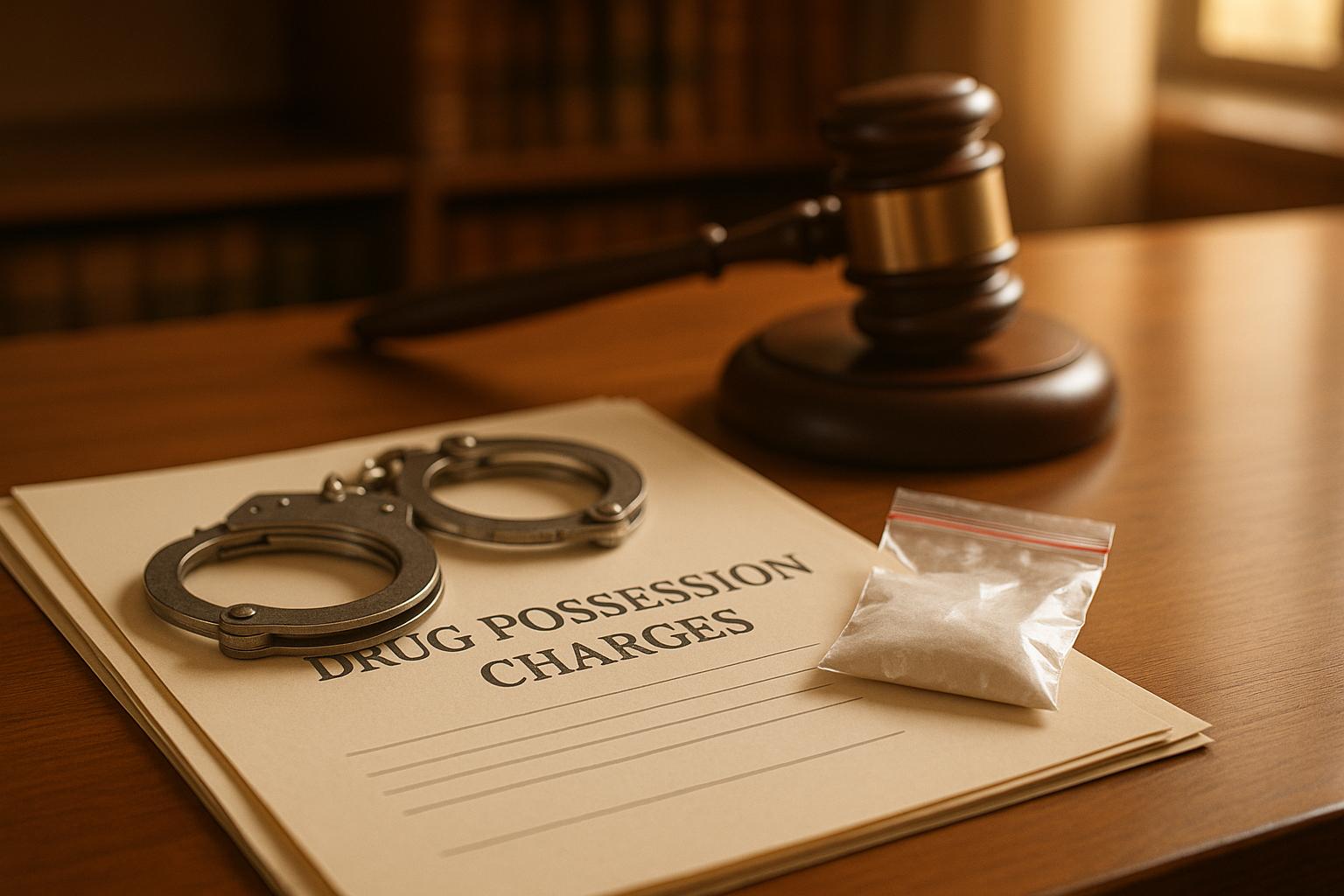Facing drug possession charges in South Carolina? Here’s what you need to know:
- Strict Laws: South Carolina has some of the toughest drug possession laws, with penalties ranging from fines to significant jail time.
- Types of Possession: Charges depend on whether it’s simple possession (personal use) or possession with intent to distribute (PWID), which carries harsher penalties.
- Key Factors: The type and quantity of the drug, along with your criminal history, determine the severity of the charges.
- Penalties: First-time offenses can include fines up to $5,000 and jail time up to 3 years, depending on the substance. Repeat offenses lead to stricter consequences.
- Defenses: Common defenses include challenging illegal searches, proving lack of possession, or presenting valid prescriptions.
Act fast: Hiring an experienced attorney and documenting every detail of your arrest can make a significant difference in your case. Whether you’re dealing with marijuana or harder substances, understanding your rights and the law is critical to protecting your future.
What Counts as Drug Possession in South Carolina

When facing drug possession charges in South Carolina, it’s essential to understand what legally qualifies as possession. South Carolina law prohibits possessing controlled substances, and knowing how possession is defined can make a significant difference in defending yourself and protecting your rights. Possession isn’t just about what you have – it’s also about how you have it and the type of substance involved.
Types of Drug Possession
Drug possession charges typically require proof of either actual possession or constructive possession. Actual possession means the drug is physically on you – like in your pocket. Constructive possession, on the other hand, refers to drugs being under your control, even if they’re not directly on you. For example, drugs found in your car or home could qualify as constructive possession if prosecutors can prove you were aware of their presence and had control over them. Simply being near drugs, like in a shared apartment, isn’t enough; the state must show you knew about the drugs and had authority over them.
Once possession is established, understanding how controlled substances are classified becomes crucial in determining penalties.
Drug Schedules 1–5
Controlled substances in South Carolina are divided into five schedules, based on their potential for abuse and accepted medical use.
- Schedule I drugs are considered to have the highest abuse potential and no accepted medical use.
- Schedule V drugs, on the other hand, are seen as having a much lower risk and have recognized medical uses.
Interestingly, while marijuana is classified as a Schedule I substance, South Carolina law imposes lighter penalties for it compared to other drugs in this category. Narcotics in Schedules II and III, especially those derived from opiates, often result in harsher penalties than non-narcotic substances in the same schedules. Schedule V substances, with their lower risk of dependence, carry the least severe consequences.
Here’s a breakdown of penalties for a first offense and repeat offenses based on drug schedules:
| Schedule | First Offense Prison Time | First Offense Fine | Repeat Offense Prison Time | Repeat Offense Fine |
|---|---|---|---|---|
| Schedule I | Up to 2 years | Up to $5,000 | Up to 10 years | Up to $10,000 |
| Schedule III | Up to 6 months | Up to $1,000 | Up to 2 years | Up to $5,000 |
| Schedule IV | Up to 3 months | Up to $500 | Up to 1 year | Up to $2,000 |
| Schedule V | Up to 30 days | Up to $200 | Up to 1 year | Up to $2,000 |
Knowing these classifications also helps distinguish between charges for personal use and those involving intent to distribute.
Simple Possession vs. Intent to Distribute
The line between simple possession and possession with intent to distribute (PWID) can significantly impact the severity of charges. Simple possession refers to knowingly or intentionally having a controlled substance for personal use. PWID, on the other hand, involves larger amounts of drugs and the intent to sell or distribute them. This offense is treated as a felony and carries much harsher penalties.
The quantity of drugs found often determines whether prosecutors charge PWID. For instance, possession of more than one gram of cocaine, two grains of heroin, four grains of morphine or opium, 15 capsules of MDMA, 20 milliliters (or milligrams) of GHB, or 50 micrograms of LSD can result in PWID charges. For marijuana, having more than one ounce crosses the threshold into PWID territory.
Prosecutors may also use other evidence, such as scales, packaging materials, large amounts of cash, or witness testimony, to prove intent to distribute. For a first offense, simple possession of a Schedule I or II narcotic is usually a misdemeanor, punishable by up to two years in jail and fines of up to $5,000. In contrast, a first-time PWID charge is a felony, carrying up to five years in prison and a maximum fine of $5,000.
In some cases, charges based solely on the weight of the drugs can be reduced to simple possession, either through prosecutorial discretion or by a jury at trial. This highlights the importance of seeking skilled legal representation when facing drug possession charges. Proper counsel can make all the difference in navigating these complex legal waters.
Penalties for Drug Possession in South Carolina
Once possession and the classification of the substance are established, the penalties in South Carolina are determined by the specifics of the case. These penalties depend on factors such as the type of drug, the amount involved, and the individual’s criminal history. Punishments can range from small fines to extended prison sentences.
First-Time Offender Penalties
For first-time offenders, the penalties vary widely depending on the drug involved. For example, being caught with less than one ounce of marijuana could lead to up to 30 days in jail and fines between $100 and $200. However, offenses involving more dangerous drugs come with harsher consequences. A first-time cocaine possession charge may result in fines up to $5,000 and a prison term of up to three years. Similarly, possessing less than one gram of methamphetamine or cocaine base is treated as a misdemeanor for a first offense, with penalties that can include up to three years in prison and fines as high as $5,000.
The classification of the drug also influences the penalties. For example, first offenses involving Schedule I or II narcotics are considered misdemeanors and can result in a fine of up to $5,000, a prison sentence of up to two years, or both. For controlled substances in Schedules I through V (excluding narcotics), first offenses typically carry lighter penalties, such as a fine up to $1,000 or up to six months in jail. Courts may also require offenders to participate in drug treatment or rehabilitation programs as part of their sentence.
Repeat Offense Penalties
Penalties for repeat offenses are much stricter. While a first offense for possessing less than one ounce of marijuana is a misdemeanor, a second offense is classified as a criminal misdemeanor, punishable by up to one year in jail and fines of up to $2,000.
For more serious drugs, repeat offenses lead to even steeper consequences. A second offense involving Schedule I or II narcotics can escalate to a felony, with penalties including up to $5,000 in fines and five years in prison. Third or subsequent offenses may result in fines of up to $10,000 and similar prison terms. For other controlled substances, penalties for repeat offenses often double, reaching fines of up to $2,000 or up to one year in jail. Drug-related convictions, including charges for possession, distribution, and trafficking, account for over 26.1% of prison admissions in South Carolina.
Felony Possession Penalties
Certain possession amounts automatically elevate charges to felonies, particularly when the quantity suggests intent to distribute. For instance, simple possession of more than one ounce of marijuana is classified as a felony in South Carolina. The penalties increase based on the quantity and the offender’s prior record. Here’s a breakdown for marijuana-related felonies:
| Offense | Penalty | Incarceration | Max. Fine |
|---|---|---|---|
| Possession of 1 oz or more (1st Offense) | Felony | 5 years | $5,000 |
| Possession of 1 oz or more (2nd Offense) | Felony | 10 years | $10,000 |
| Possession of 1 oz or more (Subsequent Offenses) | Felony | 5–20 years | $20,000 |
For drugs like cocaine and methamphetamine, felony charges often arise when there is evidence of intent to distribute. A first-offense felony in such cases can lead to up to five years in prison and fines up to $5,000.
The most severe penalties are reserved for drug trafficking offenses. Trafficking 10 to 99 pounds of marijuana for a first offense carries a prison sentence of one to 10 years and fines up to $10,000. Trafficking 10 to 28 grams of cocaine or methamphetamine can result in three to 10 years in prison and fines of up to $25,000. Additional penalties may apply if the offense occurs near schools or other protected areas.
Felony convictions extend beyond immediate penalties like jail time and fines, often affecting long-term opportunities. Understanding these distinctions is crucial when considering legal options.
Legal Defenses Against Drug Possession Charges
Facing drug possession charges in South Carolina can feel overwhelming, but there are several defenses that might help reduce or even dismiss these charges. Knowing your rights is a key step, as any evidence obtained unlawfully could be thrown out. Below are some of the most common defenses used in drug possession cases.
Illegal Search and Seizure
The Fourth Amendment protects you from unreasonable searches and seizures. If law enforcement violates these protections – like conducting a search without probable cause, a proper warrant, or valid consent – any evidence they gather can potentially be excluded from your case. For example, if an officer fabricates an emergency to justify a search, that evidence might not hold up in court. A skilled South Carolina criminal defense attorney can help determine if your rights were violated and file a motion to suppress improperly obtained evidence. This step could significantly weaken the prosecution’s case against you.
Lack of Possession
Drug possession cases hinge on whether the prosecution can prove you had either actual or constructive possession. Actual possession means the drugs were physically on you, like in your pocket. Constructive possession, on the other hand, refers to drugs found in a space you control, such as your car or home. For constructive possession, the prosecution must show you not only knew about the drugs but also had the ability to control them. In situations involving shared spaces – like a car with multiple passengers – it’s much harder for the prosecution to prove the drugs belonged to you. This gray area can form the basis of a strong defense.
Prescription or Medical Defense
If you were found with a controlled substance that was prescribed to you, this could serve as a valid defense. Even if the medication wasn’t in its original container, having proof of a prescription in your name is typically enough to avoid a conviction. However, the prescription must be from a licensed medical provider and intended for your personal use. If you’re facing charges involving prescription drugs, an attorney can help you present this defense and protect your rights.
sbb-itb-ce0cbb0
How to Protect Your Rights
When facing drug possession charges in South Carolina, your immediate actions can have a lasting impact on your case. What you do in those first moments with law enforcement can shape the outcome – whether it’s a conviction, reduced charges, or even a dismissal. Taking the right steps early lays the groundwork for a solid defense and complements the earlier advice on understanding your legal options.
Get a Lawyer Right Away
The first thing you should do after an arrest is to secure legal representation. If possible, get out of police custody and contact a criminal defense attorney immediately. A qualified attorney will evaluate the details of your arrest and work to safeguard your rights. As one expert puts it:
"The earlier you have the right attorney on your side, the stronger your defense strategies can be."
Stay composed and avoid explaining yourself to law enforcement. Instead, clearly state that you wish to speak with your lawyer.
An experienced attorney will analyze your case for any procedural missteps, such as unlawful searches or seizures. If errors are found, they may argue to suppress evidence, which could lead to charges being dropped. When choosing an attorney, focus on someone with expertise in drug-related cases and a history of success. Look into client reviews, schedule consultations to ensure their approach aligns with your needs, and clarify their fee structure upfront.
Save Evidence and Document Everything
Gathering and preserving evidence is critical. Document the time, location, and circumstances of your arrest, along with the names and badge numbers of the officers involved. Note whether you were read your Miranda rights.
Pay close attention to how any search was conducted. Did the officers have a warrant? Did they ask for consent? Were you stopped during a traffic stop, and if so, why? These details could play a key role if your attorney needs to challenge the legality of the search. Keep all related records, such as arrest reports, booking details, and receipts for confiscated property. If the case involves medication and you have a valid prescription, make sure to provide documentation proving it’s registered in your name.
If there were witnesses present during your arrest, try to collect their contact information or have someone you trust do so. Their accounts could provide valuable support for your defense.
Know Your Rights During Police Contact
Understanding your constitutional rights during interactions with law enforcement is essential. You have the right to remain silent, and your attorney will advise you on how to communicate without incriminating yourself.
Be completely honest with your lawyer once you’ve hired them. Attorney-client privilege ensures that your conversations remain confidential. If you’ve been charged with drug possession, don’t attempt to handle the legal process on your own. Reach out to an experienced criminal defense attorney as soon as possible. Taking these steps ensures your rights are protected from the start, giving you a better chance to contest the charges and achieve a fair outcome.
Next Steps
When facing drug possession charges, acting quickly and strategically is essential. Recent legal trends lean toward decriminalization and rehabilitation, especially for first-time offenders. New laws increasingly emphasize probation and treatment programs over severe penalties, but taking the right steps early on can make all the difference.
The first priority is to hire an experienced attorney and document every detail of your arrest. Time is of the essence. A skilled lawyer can pinpoint weaknesses in the prosecution’s case, such as unlawful searches, lack of evidence, or improper procedures. Be sure to preserve any physical evidence, like prescription bottles, and write down everything you remember about the arrest. These details can play a critical role in building your defense, particularly under updated documentation standards.
If this is your first offense, South Carolina’s recent legal changes could work in your favor. For certain controlled substance charges, the law now mandates probation instead of immediate jail time. Additionally, first-time offenders caught with less than one gram of methamphetamine or cocaine base are required to complete drug treatment or rehabilitation programs as part of their sentencing. Courts often view participation in these programs positively, which could help reduce penalties or even lead to the dismissal of charges.
For marijuana, South Carolina has decriminalized possession of up to one ounce (28 grams) and 10 grams of hashish. These amounts now result in civil citations rather than criminal penalties. Staying informed about these changes is crucial, as they may shape your defense strategy depending on the specifics of your case.
The steps you take now will shape your legal options moving forward. Don’t try to handle this alone – consult a professional attorney to safeguard your rights and explore every possible defense.
FAQs
What’s the difference between simple possession and possession with intent to distribute in South Carolina?
In South Carolina, the key difference between simple possession and possession with intent to distribute (PWID) comes down to the quantity of drugs found and whether there’s evidence suggesting plans to sell or distribute.
Simple possession means having a controlled substance strictly for personal use, with no signs of intent to sell. This is usually treated as a misdemeanor. For a first offense involving drugs like Schedule I or II narcotics, penalties can include up to 2 years in jail and a $5,000 fine.
PWID, however, applies when larger amounts of drugs are involved – such as more than 1 gram of cocaine or 15 MDMA pills – or when items like scales, baggies, or significant cash amounts suggest distribution. This is a felony offense, leading to much harsher penalties, including up to 5 years in prison and a $5,000 fine. Beyond that, a felony conviction can bring long-term challenges, such as losing the right to vote and difficulties securing employment.
Knowing the difference between these charges is critical, as the consequences can have a lasting impact on your life.
How can I challenge drug possession charges if the evidence was obtained through an illegal search?
If the evidence in a drug possession case was gathered through an illegal search, there’s a chance to challenge the charges. The Fourth Amendment safeguards you against unreasonable searches and seizures. If law enforcement overstepped these boundaries, your attorney can file a motion to suppress the evidence obtained unlawfully.
If the court determines the search was illegal, that evidence might be excluded from the case. This can weaken the prosecution’s position, potentially leading to reduced charges or even a dismissal. It’s essential to work with an experienced attorney who can carefully assess your case and craft a defense strategy aimed at protecting your rights.
What are the legal consequences for first-time and repeat drug possession charges in South Carolina?
In South Carolina, drug possession penalties depend heavily on whether it’s a first-time offense or a repeat violation. For first-time offenders, the charges are usually misdemeanors. This can lead to penalties like up to 30 days in jail and fines that may reach $200 for simple possession. However, the exact punishment varies based on the type and quantity of the drug involved.
When it comes to repeat offenses, the stakes get much higher. These cases often result in felony charges, with prison sentences ranging from 2 to 15 years, particularly for larger amounts or more dangerous substances. Each additional offense comes with harsher penalties, making it essential to have strong legal support to protect your rights and navigate the complexities of the legal system.





